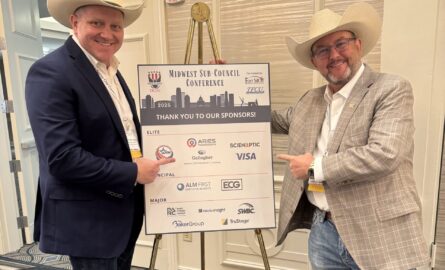 Amy Green and Brandon Ziemann just closed $3 million in Series A funding for Mamaya Health from LFE Capital and Spitha Capital. But their fundraising journey wasn’t about perfect pitch decks or flawless execution—it was about learning to tell their story without drowning in their own expertise. Here are the lessons learned from 100s of meetings with 100s of investors.
Amy Green and Brandon Ziemann just closed $3 million in Series A funding for Mamaya Health from LFE Capital and Spitha Capital. But their fundraising journey wasn’t about perfect pitch decks or flawless execution—it was about learning to tell their story without drowning in their own expertise. Here are the lessons learned from 100s of meetings with 100s of investors.
The Storytelling Trap Every Expert Falls Into
“You can get lost in producing the PowerPoint slides. You can get lost in making the model,” Brandon explains. “But the biggest thing is how can you convey something that someone will deem valuable?”
This hits at every founder’s blind spot. You know your business so intimately that you forget investors don’t live in your world. Amy puts it bluntly: “We could have made the concept of our business the most simplified version possible so that anyone who doesn’t know us could understand it easily and understand how they make money on it.”
Translation: If your mom can’t explain your business model at dinner, your pitch isn’t ready.
The Shape-Shifting Mistake: Becoming a Chameleon
Here’s where most founders sabotage themselves. Brandon admits they “changed what we wanted to do with every meeting” trying to match what each investor wanted to hear.
“They could tell,” he says. “So stick with what you know. Stick with what you’re true with and whether they like it or not, just get on your next meeting.”
Every founder does this. You walk out of a meeting thinking, “They seemed interested when I mentioned X, so I’ll lead with that next time.” Wrong move. Investors smell authenticity from across the table, and they can spot a shape-shifter just as easily.
The Numbers That Matter: 150 Investor Meetings
Amy pitched around 150 investors over two years before closing funding. Read that again: 150.
“It is a gauntlet and so hard, and so worthwhile,” Amy reflects.
When Brandon joined in February, they shifted strategy. Instead of pitching broadly, they got narrow on their “ideal profile” of an investor. They probably pitched another 10-20, but with precision.
“I learned a lot over the last two years around which type of capital was the right type for where we are at, what capital would not work or would never be an option, and wish I had known that up front.”
This is the reality of fundraising that demo days don’t show you. Most founders will hear “no” far more than “yes.” The skill isn’t avoiding rejection—it’s learning from pattern recognition across dozens of conversations to identify which investors actually fit your company stage and vision.
What Actually Matters: Know Your Numbers Cold
“You have to be able to back up what you’re putting in your models,” Brandon emphasizes. “If you start getting off tangent and start kind of BSing a little bit, they’re gonna sniff it out.”
This isn’t about having perfect projections—it’s about understanding the logic behind every assumption. When an investor asks why you think customer acquisition cost will drop 40% in year two, you better have data, not hope.
The Nashville Entrepreneur Center’s Real Value
Amy credits Project Healthcare with practical preparation: “I started to get my pitch deck together. I had coaching accessible. I got to meet with different venture firms and talk through just how they would think about approaching an investment.”
This matters because fundraising isn’t just about your company—it’s about understanding how investors evaluate opportunities. Amy learned to think like her audience before she started pitching.
The Insight That Changed Everything
Mamaya started in 2019 focused on women navigating fertility, pregnancy, postpartum, and perimenopause. Then Amy noticed a pattern in customer requests.
“When you show up for women, they ask you to show up for everyone they love—partners, children, caregivers, and chosen family,” Amy explains.
During COVID, organic referrals from friends and family outpaced formal provider referrals. The numbers told the story: roughly 40% of women invited a partner or teen into care.
That observation wasn’t just touching—it was a business model expansion backed by data. The addressable market expanded roughly 3x—from an estimated $6-8 billion (women-only mental health) to $22-25 billion (family-inclusive care). Early data suggests family-inclusive offerings boost retention by approximately 30%.
That’s what LFE Capital and Spitha Capital funded—not just a bigger vision, but a bigger, provable market with stronger unit economics.
Nearly half of women report unmet mental health needs. But Mamaya’s model recognizes that closing those gaps doesn’t just help individuals—it strengthens families, workplaces, and entire care systems.
What Happens After the Money Hits
“We’re responsible for things, but all of that comes with an incredible amount of growth that we have to continue to keep up with,” Amy reflects. The money solves one problem and creates ten new ones.
Brandon joined Mamaya just six months ago as COO/CFO to help close the raise. His perspective on making the leap from private equity structure to startup autonomy shows exactly what founders trade when they choose entrepreneurship—and why having the right support network matters.
“You get that autonomy, and you get that ability to drive your vision real time. You don’t have a lot of bureaucracy to work through,” Brandon notes. But you also don’t have the infrastructure. Every decision lands on your desk.
The Pattern That Actually Works
What emerges from Amy and Brandon’s experience isn’t a fundraising formula—it’s a mindset shift. Stop trying to impress investors with complexity. Start helping them understand why your solution matters and how it makes money.
Mamaya’s mission expanded from women’s mental health to supporting “women and the people they love”—a broader vision that resonated because it solved a bigger problem with better economics, not because it sounded more impressive.
The lesson: Your next investor meeting isn’t about proving how smart you are. It’s about proving how clearly you think about the problem you’re solving and why someone should bet money on your ability to solve it.
Sometimes the most sophisticated strategy is simply telling the truth about what you’re building and why it matters.
| The Mistake | The Fix | Why It Matters |
|---|---|---|
|
The Expert’s Trap: |
Tell Your Story First: |
Investors don’t live in your world—clarity beats complexity every time |
|
Being a Chameleon: |
Stay Authentic: |
“They could tell. So stick with what you know.” Investors spot inauthenticity immediately |
|
Winging the Numbers: |
Know Your Data Cold: |
“If you start BSing a little bit, they’re gonna sniff it out” |
|
Pitching in a Vacuum: |
Learn Their Language: |
Fundraising isn’t just about your company—it’s about understanding how investors think |
|
Overcomplicating Everything: |
Simplify to Scale: |
The most sophisticated strategy is telling the truth about what you’re building |
|
Thinking Money Solves Everything: |
Plan for What’s Next: |
The money solves one problem and creates ten new ones |
Based on insights from Amy Green & Brandon Ziemann, Mamaya Health
Nashville Entrepreneur Center Project Healthcare Alumni



